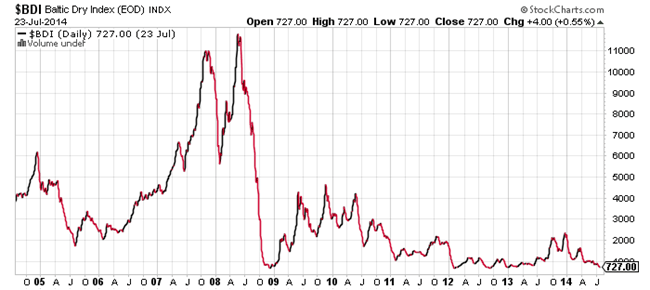Earlier this month, Jeremy Siegel, a well-known “bull” on CNBC, took to the airwaves to predict the Dow Jones Industrial Average would go beyond 18,000 by the end of this year. Acknowledging overpriced valuations on the key stock indices are being ignored, he argued historical valuations should be taken with a grain of salt and nothing more. (Source: CNBC, July 2, 2014.)
Sadly, it’s not only Jeremy Siegel who has this point of view. Many other stock advisors who were previously bearish have thrown in the towel and turned bullish towards key stock indices—regardless of what the historical stock market valuation tools are saying.
We are getting to the point where today’s mentality about key stock indices—the sheer bullish belief stocks will only move higher—has surpassed the optimism that was prevalent in the stock market in 2007, before stocks crashed.
Corporate Earnings
At the very core, when you pull away the stock buyback programs and the Fed’s tapering of the money supply and interest rates, there is one main factor that drives key stock indices higher or lower: corporate earnings. So, for key stock indices to continue to make new highs, corporate profits need to rise.
But there are two blatant threats to companies in the key stock indices and the profits they generate.
First, the U.S. economy is very, very weak. While we saw negative gross domestic product (GDP) growth in the first quarter of this year, the International Monetary Fund (IMF) just downgraded its U.S. economic projection. The IMF now expects the U.S. economy to grow by just 1.7% in 2014. (Source: International Monetary Fund, July 24, 2014.) One more negative quarter of GDP for the U.S., and we are in a technical recession. We’re already halfway there!
If the U.S. economy does not improve, companies on key stock indices will have troubles selling their goods and services, and their corporate earnings will suffer. It is that simple.
Next, the global economy is in trouble here in 2014. The Baltic Dry Index (BDI) is breaking down to new lows. The BDI suggests demand in the global economy is reaching multiyear lows—since the beginning of the year, the BDI is down 65%.

Chart courtesy of www.StockCharts.com
An economic slowdown in the global economy affects the corporate earnings of companies in the key stock indices because they earn a massive amount of their revenues from overseas.
Consider Caterpillar Inc. (NYSE:CAT). In the second quarter of this year, the company earned more than 55% of its revenue from outside North America. It experienced a three-percent decline in overall revenue in its second quarter because of weak sales in the global economy. (Source: Caterpillar Inc., July 24, 2014.) Almost 50% of the revenues for the S&P 500 companies come from outside of the U.S. economy.
Dear reader, I may be the last bear standing. My skepticism toward the key stock indices grows every time stock prices tick higher.
Stocks are overvalued by the majority of historical stock market valuation tools: the price-to-earnings (P/E) multiple, the dividend yield, earnings growth, revenue growth, the VIX Fear Index, insider selling, bullishness amongst stock advisors, the amount of money investors have borrowed to buy stock, and the economy.
The problem with reality in 2014 is the same problem we had with reality in 2007. “Historical stock market valuations no longer matter” was the language of 2007. It’s frightening to see it’s the same language of 2014.